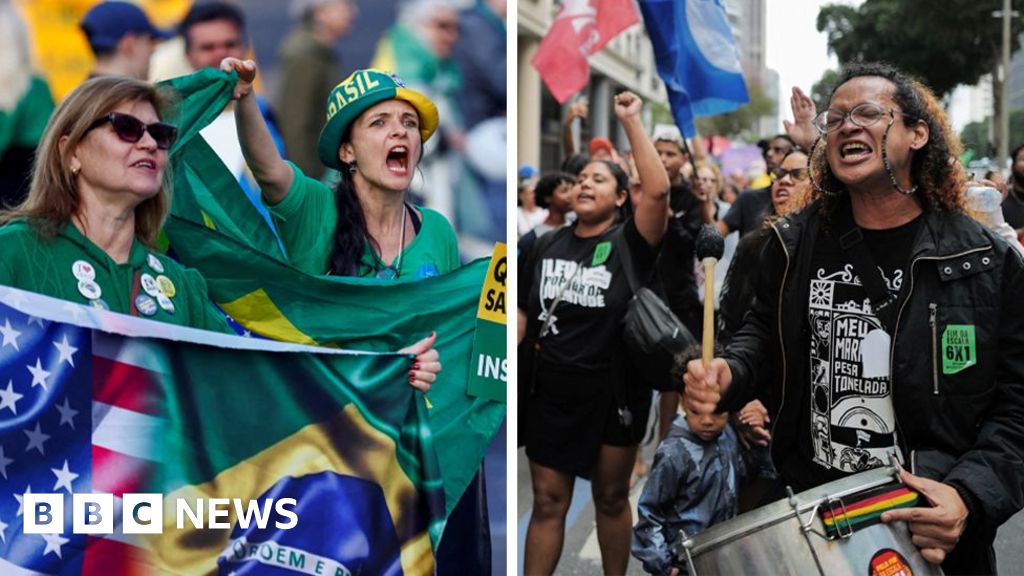Ione WellsSouth America correspondent in São Paulo
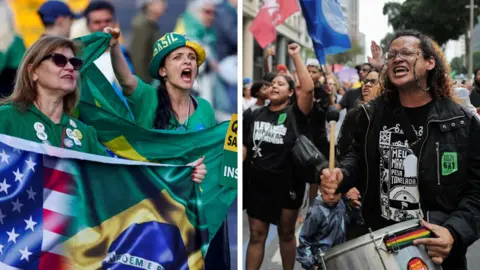 Reuters
ReutersOn Sunday, Brazilians celebrated their country’s independence from Portugal as they do every year on 7 September: with patriotism, military parades, flag-waving and churrascos – Brazilian barbecues.
But with a verdict imminent in the trial on coup charges of former President Jair Bolsonaro, this year the day was marked by rival rallies.
Thousands took to the streets chanting slogans about freedom: some in defence of democracy, others in defence of the ex-president who stands accused of trying to overthrow it.
On Tuesday, five Supreme Court justices will start to deliver their verdicts one by one on whether Jair Bolsonaro masterminded a coup to cling to power after losing the 2022 election to his left-wing rival, Luiz Inácio Lula da Silva.
The allegations include proposing a coup to military commanders, knowing of a plot to assassinate President-elect Lula da Silva and Supreme Court Justice Alexandre de Moraes, and inciting supporters to attack government buildings on 8 January 2023 after casting doubt on the electoral system.
Bolsonaro denies the charges, calling them politically motivated, a view shared by his supporters – and US President Donald Trump.
Trump has labelled the trial “political persecution” and imposed 50% tariffs on Brazilian goods, as well as sanctions on Supreme Court Justice Moraes, who is leading the trial.
Jair Bolsonaro’s son Eduardo, who successfully lobbied for the imposition of the tariffs in the US, has defended the move, telling the BBC last month that he believes “freedom comes first, before the economy”.
But many Brazilians see it as deeply unpatriotic to support inflicting economic pain on Brazil for the Bolsonaro family’s own political fortunes.
“Brazil is totally divided,” acknowledged Bianca, who attended a large pro-Bolsonaro rally in São Paulo on Sunday.
“But I believe with US sanctions, those who were in favour [of the trial] are taking their foot off the gas,” she added, draped in combined Brazilian and US flag.
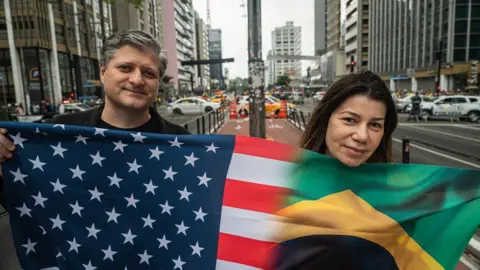 BBC/Paulo Kobayashi
BBC/Paulo KobayashiPatriotic symbols like Brazil’s national flag and football shirt have long been co-opted as the uniform of Bolsonaro’s right-wing base, but some also donned Trump paraphernalia.
Crowds demanded “Amnesty!” and “Moraes, out!”
Another protester, Erica, said the trial was “just a big theatre because everyone knows his conviction is already determined”.
But there are many here who disagree.
At a nearby rally of Bolsonaro opponents, crowds chanted “no amnesty” and “dictatorship, never again”.
Huge inflatable figurines of Bolsonaro in a prison uniform and Trump bobbed above signs saying: “Prison for Bolsonaro” and “Trump, paws off Brazil”.
One wore the football shirt, which left-wing Brazilians hope to reclaim, saying “I’m not a Bolsonaro minion”.
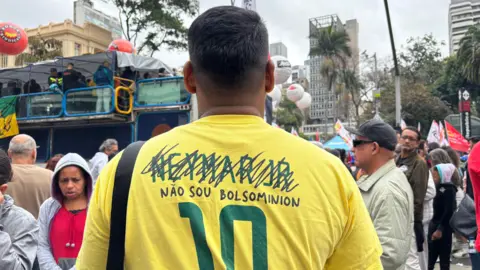 BBC/Paulo Kobayashi
BBC/Paulo KobayashiThe crowd was optimistic he could be convicted.
One of the protesters, Rafael, called Bolsonaro’s arrest a “victory”, accusing him of having committed “serious crimes” against Brazilians.
“It’s still very polarised. Until recently, the right was strong. But since Trump’s actions there’s been a shift to the left. It’s about sovereignty and preventing foreign interference,” he added.
“All the evidence shows it was a coup attempt,” said Karina. “I hope justice is done to show you can’t do whatever you want for your own gain.”
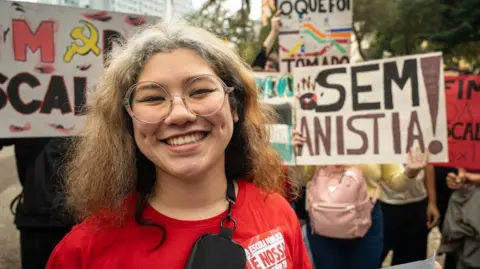 BBC/Paulo Kobayashi
BBC/Paulo KobayashiThis trial has carved deep rifts and reignited debates about democracy in Brazil.
The 8 January riots and the coup allegations are so troubling to Bolsonaro critics because Brazil’s democracy is still young.
It was restored in 1985, after two decades of a dictatorship backed by the US.
The Supreme Court casts itself as guardian of this democracy.
But it has become a lightning rod. Its judges are appointed by presidents but can also put presidents and ministers on trial.
Some sit on the electoral court and strike down laws. Its president was once Lula’s lawyer, adding fuel to accusations of bias from Bolsonaro supporters.
An inquiry into fake news, including online threats to the court, led by Justice Moraes has jailed Bolsonaro allies and taken down social media accounts.
Critics say this stretches the court’s remit into policing and politics; supporters call it a model for the digital age.
The court’s role in Bolsonaro’s trial, in which Moraes is both a rapporteur and the target of the alleged assassination plot which is part of the case, has led both sides to accuse the other of authoritarianism.
Bolsonaro’s critics argue he attempted to install a dictatorship.
His supporters, on the other hand, say the sweeping powers the court has used to investigate the alleged coup and the rioting in the capital, Brasília, are an abuse of judicial powers.
Those who believe the judiciary has gone too far in prosecuting people involved in the storming of government buildings on 8 January 2023 often cite the case of Débora Rodrigues dos Santos.
The 39-year-old Bolsonaro supporter received a 14-year sentence after scrawling “You lost, idiot” in lipstick on the statue of Justice outside the Supreme Court.
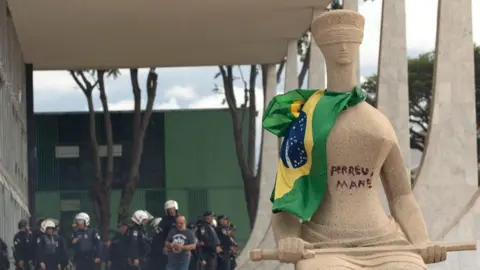 Joédson Alves, Agência Brasil
Joédson Alves, Agência BrasilWhile her prison sentence was later turned into house arrest because she has children who she cares for, the fact that she was tried on coup charges before the Supreme Court continues to anger many.
“They tried her for graffiti. I’ve never heard of someone being sentenced to 14 years in prison for lipstick. It was a demonstration, and they were labelled as terrorists,” her sister Claudia told the BBC.
Claudia said Débora regretted the graffiti but did not regret attending the 8 January protest, which she said was her “right” as she had lingering “doubts” about the outcome of the election.
 BBC/Paulo Kobayashi
BBC/Paulo KobayashiClaudia credits Bolsonaro’s “love for the flag” with inspiring “housewives, the WhatsApp aunt, the bricklayer, the businessman” to engage in politics.
She argues that, because no coup materialised, Bolsonaro cannot be guilty of one.
“If he is convicted of a coup, that also condemns 1,200 people who were protesting there,” she said.
But there are others who think the events of 8 January 2023 were much more than a simple protest.
Ricardo Cappelli is the former minister tasked with restoring order in Brasília after the storming of the key buildings.
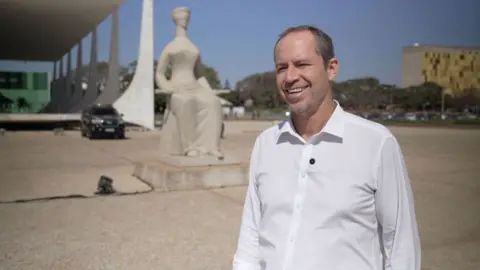 BBC/Paulo Kobayashi
BBC/Paulo KobayashiHe recalls “coup-mongering” protesters invading three branches of government and committing “barbaric acts” in the Supreme Court, “symbolically attacking an institution fundamental to Brazilian democracy”.
He believes this trial will help “turn a page in history” by showing Brazil will not tolerate threats to democracy again.
“Never have those behind a coup or attempted coup sat in the dock in Brazil,” he told the BBC.
To him, the trial also sets a global example. He argues that if the US Capitol riots had happened in Brazil, “Donald Trump would most likely be sitting in the dock”.
As a verdict nears, Bolsonaro’s party – which has a majority in Congress – is pushing a bill to grant him and the 8 January protesters amnesty, as nerves build that their alleged ringleader is about to fall.
Mr Cappelli’s answer to those who call the response authoritarian is: “Study history. Amnesty for past coup attempts resulted in new coups. Today’s pardoned coup plotter becomes tomorrow’s coup plotter.”
For years, Bolsonaro has split Brazil into loyalists and opponents.
For his fans, this trial equals persecution for a coup that never happened; for his critics, protection against another dictatorship.
Even some moderate right-wingers hope this trial might finally draw a line, but with such different definitions of authoritarianism, polarisation could still deepen.

